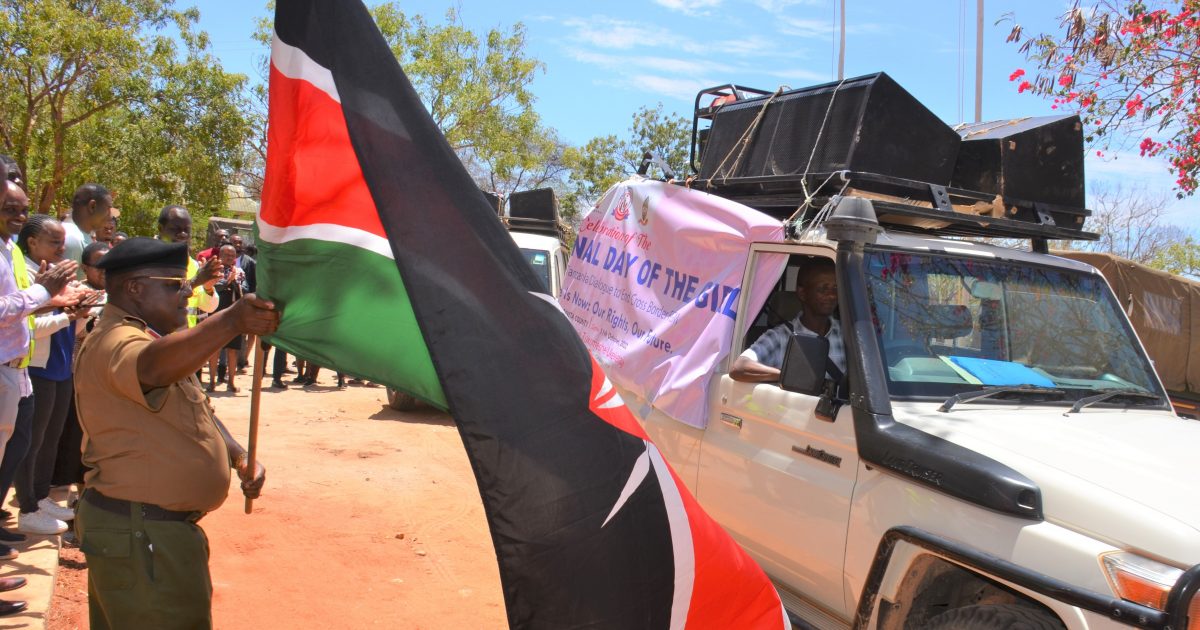The government will commemorate the International Day of the Girl by hosting a cross-border dialogue forum comprising influential elders from Kenya and Tanzania in Taveta as part of a long lasting strategy to enhance communal efforts in eradication of Female Genital Mutilation (FGM) activities in Taita-Taveta County.
This inaugural inter-state FGM discussion will bring together dozens of elders from the Maasai community in Kenya and Tanzania, who will propose and adopt long-lasting solutions to curb the rampant vice in the region.
Speaking in Mwatate on Monday during a flag-off of a publicity convoy by the Anti-FGM Board, County Commissioner Loyford Kibaara said the proposed conference will bring on board all key stakeholders in gender matters to propose and design strategies to contain the outdated practice.
He further expressed alarm that the region continued to hold the odious title of being amongst the counties with the highest rate of FGM incidences in Kenya.
“This dialogue is timely. We are engaging elders from the Kenyan side and those from Tanzania to propose workable solutions to this menace. Having on board key stakeholders and especially the communities that practice it will be a big boost in the war against FGM,” Mr Kibaara said.
Taveta sub-county is classified as an FGM hotspot due to the constant migration across the border by members of the Maasai community.
Reports say that girls at puberty are often sneaked across the border for the cut to evade the law. This cross border FGM practice poses a challenge to authorities in view of the different legal regimes adopted by the two countries, which limit potential action by law enforcement officers.
FGM data gleaned from the Demographic Health Survey (KDHS) 2013 indicates that Taita-Taveta was amongst the 22 counties which recorded the highest FGM rate in Kenya. At 22 per cent, Taita-Taveta County is higher than the national average, which stands at 21 per cent.
The County Commissioner said looping in the elders who are influential and respected in their communities will significantly empower the anti-FGM crusaders who need support from such actors.
“The elders are an asset in this exercise and their input is needed,” he said.
He further disclosed that families stuck with this outdated culture had improvised and adopted sly methods to evade the consequences of the law. Apart from sneaking their young girls across the border, another ruthless method employed was to conduct FGM at infancy or at a very young age to avoid detection. This makes it difficult for authorities to nab the perpetrators.
“The culprits have changed tact. They are doing this act on infants and babies. We have health providers on board to identify babies who are victims of this crude culture,” he said.
Mwatate MP Peter Shake termed the FGM practice as extremely demeaning to women. He called for the church to strongly condemn the vice and actively preach against it.
He added that apart from subjecting the victim to physical pain, FGM also scarred a child for life and eventually became a key source of mental trauma that affected holistic growth.
“We are asking for the intervention of the church to help us condemn this vice. It is demeaning and only works towards ruining young girls’ lives,” he said.
Mr. Nyerere Kutwa, Project Manager with Anti-FGM board, said the board had picked Taveta as the national venue to celebrate this year’s International Day for the Girl owing to the high cases of cross-border FGM incidents reported in the county.
Mr. Kutwa noted that the commemoration on Tuesday will entail hosting elders from both Kenya and Tanzania to engage in constructive debate on how to eliminate this vice.
“The communities live at the border. They smuggle girls across the border and circumcise them, which is against the law. We want the elders to come on board and help us stop this vice,” he said.
Ms. Josephine Mboje, the county chair of Maendeleo Ya Wanawake, explained that FGM was perpetuated by the misguided belief that it instilled good morals and discouraged promiscuity in young girls. She termed the beliefs as misleading and not backed by any scientific research.
However, the anti-girls’ cut campaign has received significant support from the county government through enactment of an Anti-FGM policy that will create a legal framework for combating the vice.
County Director of Gender Affairs Wallace Mwaluma said the policy was awaiting confirmation of new County Executive Committee Members (CECMs) by the new administration to be put into practice.
“The anti-FGM law gives impetus to the fight against this vice in the county,” he said. It also outlines the modalities and areas of cooperation between the county and other stakeholders.
By Wagema Mwangi




